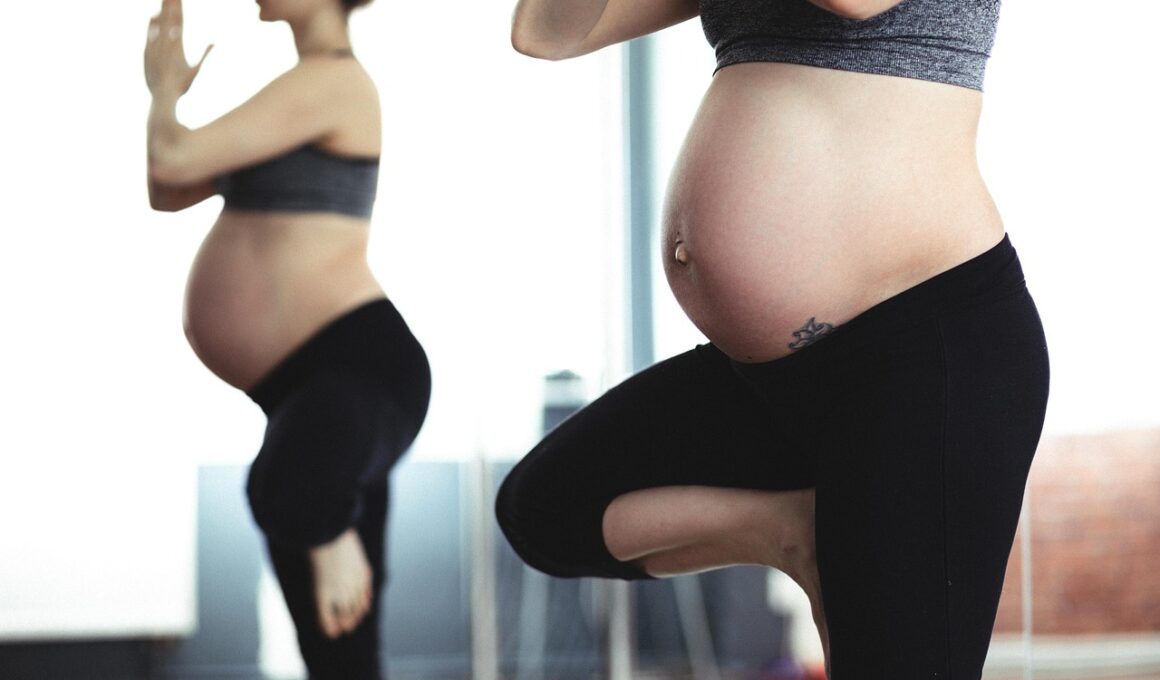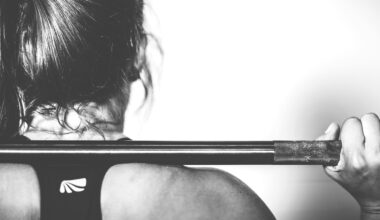Prenatal Pilates for Core Strength and Stability
Pilates offers numerous advantages for pregnant women, particularly when it comes to core strength and stability. Maintaining a strong core during pregnancy is essential for supporting the growing belly and alleviating common discomforts. Engaging in Pilates helps to strengthen the abdominal muscles, pelvic floor, and back, which are vital for posture and balance. Furthermore, regular Pilates sessions can enhance flexibility and promote better body awareness, essential for adapting to the physical changes during pregnancy. By incorporating controlled movements and breathing techniques, Pilates encourages relaxation while providing foundational strength. Many prenatal Pilates classes are designed specifically to address the unique needs of expectant mothers. Through tailored exercises, it is possible to reduce the risk of diastasis recti, a condition where abdominal muscles separate, creating discomfort. In addition, focused movements can help improve circulation, reducing common swelling. Strengthening the core through Pilates can also lead to easier labor and quicker postpartum recovery. Overall, Pilates not only supports physical well-being but also fosters a positive mindset during the transformative journey of pregnancy, empowering women to embrace their changing bodies.
Pilates may enhance mental health during pregnancy, a time characterized by emotional fluctuations. Participating in structured exercise, like prenatal Pilates, encourages a sense of control and self-efficacy. Regular practice promotes the release of endorphins, which can help reduce feelings of anxiety and depression. Within a welcoming environment, women can bond with others, creating a supportive community. Social connections form an essential safety net, allowing expectant mothers to share experiences and foster friendships. The incorporation of gentle stretching and relaxation techniques helps alleviate the physical tension caused by stress. By encouraging mindfulness, Pilates can improve focus and provide a mental escape during pregnancy. Classes often emphasize deep breathing, allowing participants to connect with their bodies in a positive way. Moreover, learning about body awareness facilitates a deeper understanding of the physical changes occurring during pregnancy. Engaging with an instructor knowledgeable in prenatal modifications ensures the exercises are performed safely and effectively. As a result, expectant mothers can feel empowered in their bodies through various stages of their pregnancy. Ultimately, integrating mindfulness practices in Pilates supports the emotional and mental well-being necessary for a healthy pregnancy.
Physical Benefits of Prenatal Pilates
One of the primary physical benefits of Pilates is improving posture. The changes in body shape during pregnancy can lead to discomfort, aches, and pains. Pilates emphasizes alignment, which can help minimize these physical challenges. Strengthening the back and shoulder muscles plays a crucial role in maintaining proper posture, contributing to better spinal health. Additionally, Pilates focuses on core stabilization, proving effective in preventing excessive strain on the lower back. The hip and pelvic mobility gained through Pilates exercises can enhance comfort and reduce tension in these areas, a common concern during pregnancy. Improving flexibility through Pilates contributes to a greater range of motion, making it easier to transition between various activities throughout the day. Moreover, practicing Pilates can help prevent common pregnancy-related issues such as sciatica and round ligament pain. Incorporating breathing techniques not only aids relaxation but also supports more efficient oxygen exchange for both mother and baby. Overall, the comprehensive approach of Pilates addresses various physical challenges and prepares expectant mothers for labor and delivery by promoting strength, flexibility, and proper alignment throughout their pregnancy.
One essential aspect of prenatal Pilates is the emphasis on the pelvic floor, which supports several critical functions during and after pregnancy. Strengthening the pelvic floor helps women prepare for labor by providing the necessary support needed during childbirth. Controlled movements in Pilates can enhance the awareness and functionality of these muscles, which can be particularly beneficial after delivery. A strong pelvic floor can minimize the risk of urinary incontinence, a common issue for many women after childbirth. Additionally, Pilates encourages proper breathing techniques that alleviate tension and enhance relaxation, allowing for better pelvic floor engagement during contractions. Moreover, practicing these exercises can lead to improved sexual health, as a healthy pelvic floor contributes to overall reproductive well-being. As the body changes, maintaining awareness of the pelvic area can provide a sense of empowerment. Pilates can also foster a deeper connection between mothers and their babies, as strengthening these muscles allows for greater body awareness. Expectant mothers can significantly benefit by focusing on pelvic health through this mindful approach, which ultimately provides lasting advantages during pregnancy and postpartum recovery.
Improved Stamina and Endurance
Prenatal Pilates promotes improved stamina and endurance, essential attributes for expectant mothers, especially as they approach labor. Engaging in regular, low-impact exercise helps build overall cardiovascular fitness, vital for maintaining energy during pregnancy. Enhanced stamina can make daily activities easier and more enjoyable, reducing feelings of fatigue that many women experience. The structured nature of Pilates encourages participants to focus on their breath and movement, promoting efficient energy use. As a result, women may find themselves feeling less worn out throughout the day. Techniques learned during Pilates sessions can be beneficial for managing the physical demands of labor, as endurance plays an integral role. The emphasis on controlled movements helps women gain valuable experience in pacing themselves, which can contribute to a more positive childbirth experience. Additionally, developing core and leg strength through Pilates allows for better positioning during labor, which can help alleviate discomfort. Stronger muscles support the body during the strenuous process, making it vital for pregnant women to prioritize their fitness. Ultimately, improved stamina through Pilates leads to greater self-confidence as women approach childbirth.
Advocating for prenatal exercise is essential to enhancing the overall physical experience of pregnancy. Pilates serves as an excellent platform through which expectant mothers can foster a connection with their bodies, enhancing the mind-body relationship. Enhanced focus on bodily sensations contributes to increased self-awareness during various pregnancy stages. Incorporating breathwork into these sessions teaches women to relax and allows them to remain present during intense moments. This mindfulness practice can also promote relaxation during labor, supporting a more positive experience overall. Furthermore, engaging with a certified instructor ensures that participants receive personalized guidance tailored to their specific needs. The instructor conducts prenatal Pilates classes, keeping mothers informed about any adjustments. This is essential for ensuring the exercises remain safe and effective. Different exercises can be modified depending on each woman’s comfort and fitness level. This conversation surrounding individualized approaches leads to increased confidence, allowing mothers to advocate for their needs and preferences. Ultimately, nurturing this connection with their bodies through Pilates results in a deepened appreciation for the various stages of pregnancy, fostering compassion and understanding for themselves.
Conclusion: Embracing a Healthy Pregnancy Journey
In conclusion, embracing prenatal Pilates can significantly enhance an expectant mother’s overall experience during pregnancy. The various benefits, including core strength, improved posture, and pelvic floor awareness, contribute to a holistic approach to physical well-being. Additionally, the mental and emotional advantages fostered through mindfulness and community support help women navigate this transformative journey with resilience. By prioritizing fitness and nurturing body awareness, mothers can cultivate a positive mindset during a time filled with uncertainty and change. This proactive approach not only prepares women for labor but also promotes long-term health by establishing a foundation for postpartum recovery. The gentle nature of Pilates ensures that women can continue practicing throughout their pregnancy without risk of injury. Therefore, integrating prenatal Pilates into a woman’s routine can empower her for the challenges ahead, enabling her to embrace the advanced stages of motherhood confidently. Whether practicing alone or in a supportive group setting, Pilates offers a unique opportunity for expectant mothers to connect with their bodies and fellow parents. By committing to this exercise form, women can transform their pregnancy journey, forging a path toward continued health and wellness.
Overall, Pilates can substantially enhance the prenatal experience, paving the way for healthier pregnancies and happier mothers. Instilling self-care practices through exercise strengthens both the body and the mind, nurturing an environment conducive to well-being. As awareness of the positive impact of prenatal exercise continues to grow, more women will have the opportunity to experience the myriad benefits that Pilates provides, improving their overall quality of life during pregnancy.


